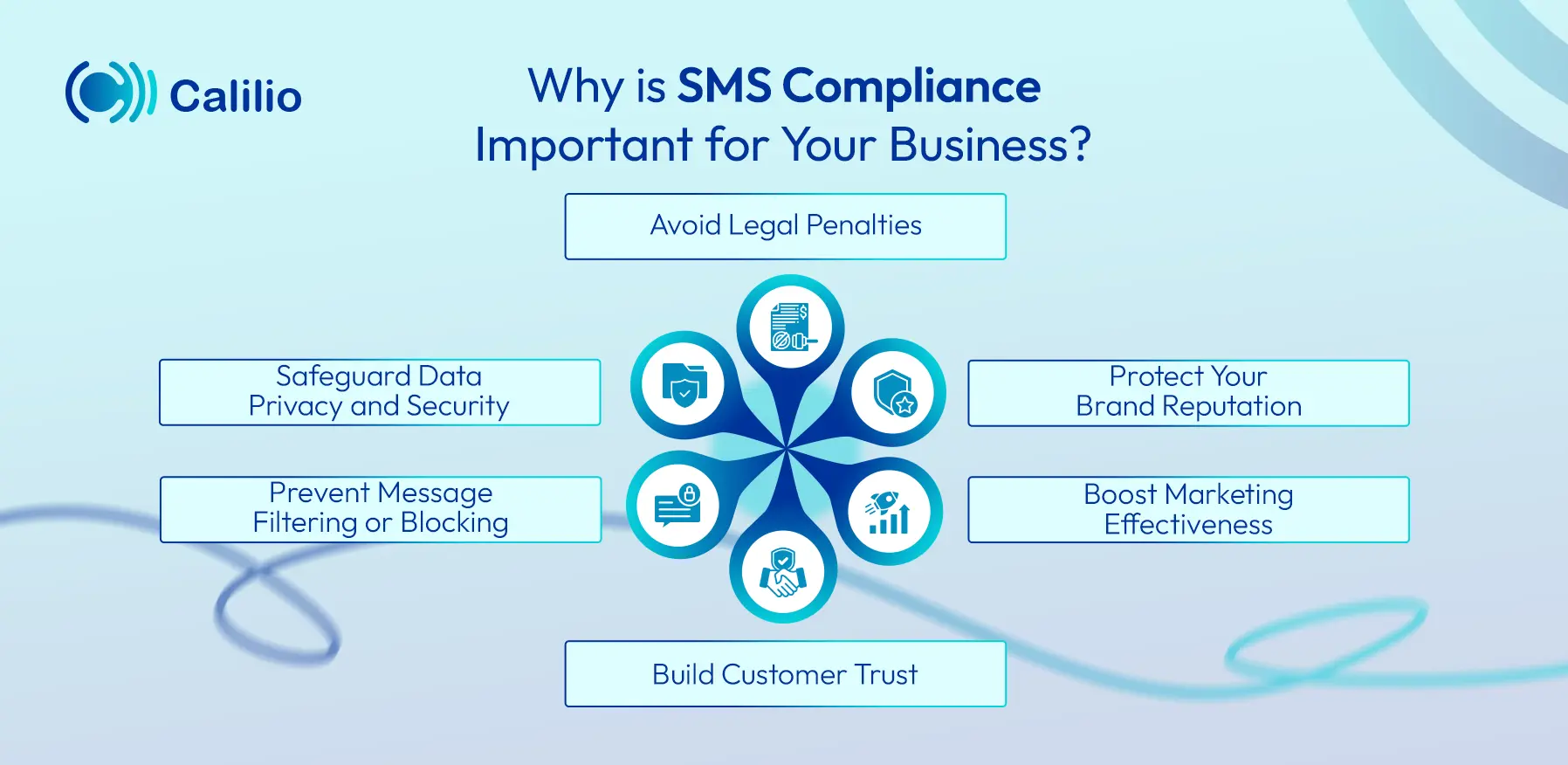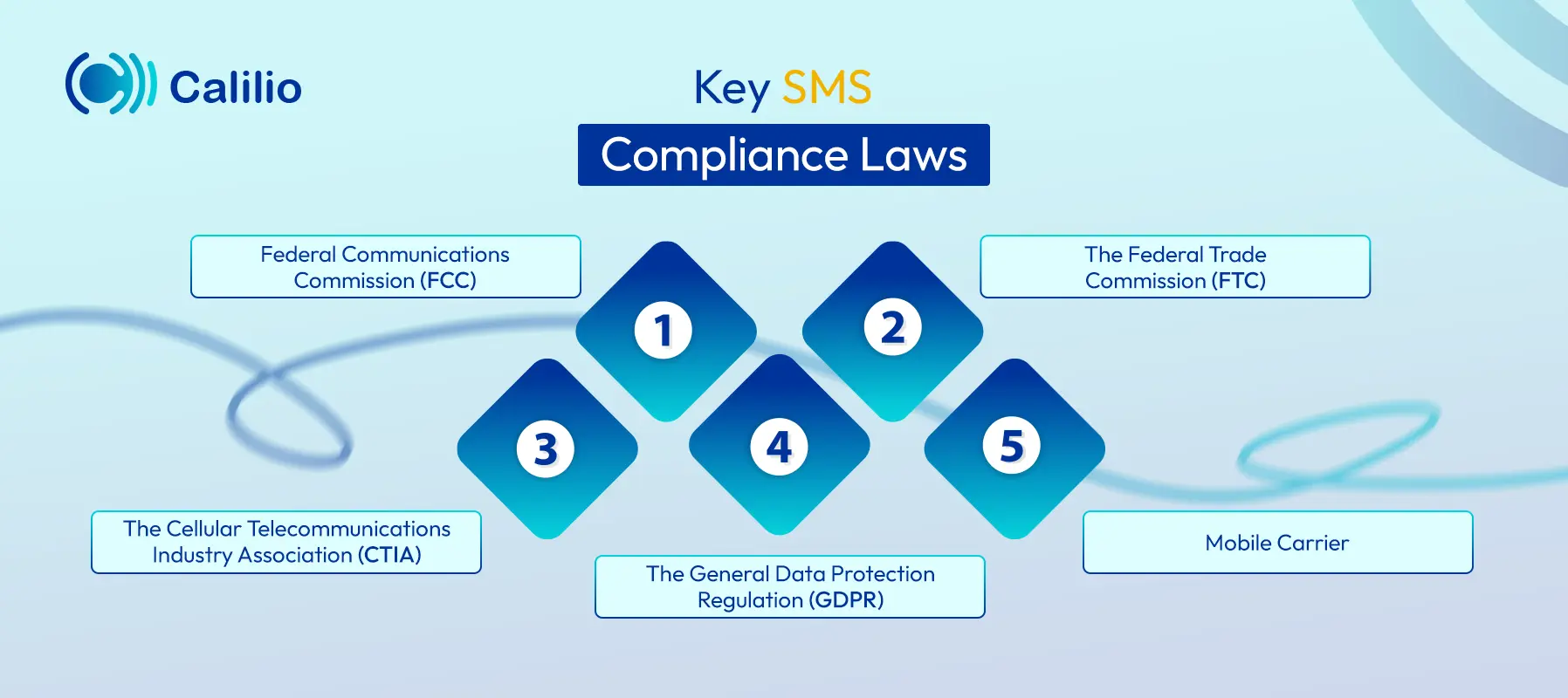SMS Compliance: How to Text Legally and Protect Your Business

SMS is a simple and direct way for businesses to reach their customers, whether it's for promotion or support. But as the SMS usage grows, there’s also an increase in spam and unwanted messages.
This is where SMS compliance laws are in place to protect consumers from spam and make sure businesses follow rules when sending messages. By staying compliant with these rules, businesses can ensure they are sending messages legally and avoid costly penalties. It also helps to build trust with customers.
In this blog, we’ll cover what SMS compliance means, why it matters, and how your business can stay on the right side of the law when sending texts to customers.
Key Highlights:
SMS compliance is a specific set of rules and industry standards that ensure legal and ethical SMS communication.
SMS compliance enables businesses to avoid fines, enhance marketing effectiveness, and maintain customer trust by adhering to privacy and data protection laws.
SMS compliance is governed by several authorities, including the FCC, FTC, and GDPR, as well as mobile carriers such as AT&T and T-Mobile.
Some of the best SMS compliance practices include obtaining clear consent, providing opt-out options, and adhering to data protection laws to ensure legal and ethical communication.
What is SMS Compliance?
SMS compliance refers to the specific laws, regulations, and industry standards that businesses must follow when sending text messages to their customers. These legal and regulatory guidelines protect customers from unwanted spam, deceptive practices, and privacy violations.
To stay compliant, businesses must get proper consent before sending messages and clearly identify themselves in each communication. They must also provide an easy way for recipients to opt out at any time.
Get Legally Compliant Virtual Phone Numbers Online to Send & Receive Messages!
Why is SMS Compliance Important for Your Business?
SMS compliance is important for businesses to avoid legal penalties, maintain a positive brand reputation, and build customer trust. Moreover, it also boosts SMS marketing effectiveness, prevents message blocking, and keeps customer data secure.

- Avoid Legal Penalties: Complying with SMS regulations helps you avoid hefty fines and legal costs.
- Protect Your Brand Reputation: Sending clear, spam-free, and trustworthy messages helps build a positive brand image.
- Boost Marketing Effectiveness: Using compliant SMS ensures that you send messages only to customers who have opted in, increasing engagement rate.
- Build Customer Trust: Prioritizing privacy preferences helps you build trust and loyalty with customers.
- Prevent Message Filtering or Blocking: Following carrier and regulatory guidelines makes sure your messages aren’t blocked before reaching your audience.
- Safeguard Data Privacy and Security: SMS compliance protects customer data by requiring consent, secure handling, and clear opt-out options.
SMS Compliance: Key Terminologies to Know
The key SMS compliance terminologies include opt-in and opt-out, PEWC, TCPA, SHAFT, and 10DLC.
- Opt-in: Opt-in is when a customer gives you explicit permission to send them text messages. It’s the foundation of SMS compliance. Without opt-in, your messages can be considered illegal spam.
- Opt-out: Opt-out occurs when a customer requests to stop receiving your texts, such as by replying "STOP". You must honor opt-out requests immediately. It’s a legal requirement and essential for maintaining trust.
- Prior Express Written Consent (PEWC): PEWC is a form of permission, often required for marketing texts, where the recipient gives written (or digital) consent. For promotional texts, PEWC provides legal proof that the recipient agreed to receive your messages.
- SHAFT: SHAFT refers to content related to Sex, Hate, Alcohol, Firearms, and Tobacco, which is often restricted or prohibited in SMS. Regulators and mobile carriers enforce strict rules around these topics, and violating these restrictions can result in blocked messages or account suspension.
- TCPA (Telephone Consumer Protection Act): The TCPA is a US law governing SMS, particularly in relation to obtaining consent. TCPA is the primary legal framework for business SMS in the US ,and violating it can result in significant fines.
- 10DLC (10-Digit Long Code): 10DLC is a standard 10-digit phone number used by businesses in the US for text messaging. To use it, businesses must register their number with The Campaign Registry. This registration helps carriers recognize the messages as official business communication.
Who Regulates SMS Compliance Laws? [Key SMS Compliance Laws]
Government regulatory agencies, such as the Federal Communications Commission (FCC) and the Federal Trade Commission (FTC), and non-profit trade associations like the Cellular Telecommunications Industry Association (CTIA), regulate SMS compliance laws for businesses. In addition, mobile carriers like AT&T and T-Mobile also set their own rules and requirements to ensure message security and proper delivery.

1. Federal Communications Commission (FCC)
In the US, the FCC is a major governmental authority for communications, including text messages. It regulates SMS adherence through the TCPA. This law requires businesses to get permission before sending marketing messages to customers.
2. The Federal Trade Commission (FTC)
The Federal Trade Commission (FTC) establishes guidelines for commercial email and text marketing. Similar to TCPA compliance SMS regulations, this law also aims to protect consumers from deceptive and unwanted messages. It also requires businesses to provide a simple way for customers to opt out.
3. The Cellular Telecommunications Industry Association (CTIA)
CTIA is a trade group in the US that sets best practices for SMS, which mobile carriers enforce. Although not a law, carriers enforce CTIA guidelines, and non-compliance can lead to message blocking.
4. The General Data Protection Regulation (GDPR)
The GDPR is a law in the European Union that protects people’s personal data during business communication. According to GDPR guidelines, businesses must obtain consent from individuals before sending marketing messages. And, it also requires companies to be clear and honest about how they collect and use data.
5. Mobile Carrier
Mobile carriers like AT&T, T-Mobile, and Verizon have their own SMS consent rules. They ensure that messages sent through their networks comply with both legal requirements and industry standards. They monitor SMS traffic and can block or filter messages that don’t meet these standards.
SMS Compliance Checklist: Best Practices for Sending SMS Compliant Texts
To ensure SMS compliance, businesses must obtain consent, provide opt-out options, and adhere to data protection laws such as GDPR and CCPA. You must also limit message frequency, avoid restricted content, and keep accurate records for SMS.
1. Obtain Clear Consent
Always get permission from individuals before sending any marketing SMS messages. The most common way to do this is by providing a sign-up form, where the user agrees to receive your message. You can also use SMS opt-in messages, like a prompt that says “Text YES to join” or a checkbox on a sign-up form.
2. Provide Simple Opt-out Options
Every SMS you send must also include a simple opt-out option like “Reply STOP to unsubscribe”. And, you must honor opt-out requests immediately and ensure that customers stop receiving messages at the same time. By doing so, you can maintain your business reputation while staying compliant.
3. Consider Message Frequency
Sending fewer, but more targeted messages, helps reduce opt-outs due to excessive texts. When someone agrees to receive texts, they expect updates that match their interests, not constant promotions. So, limit your message frequency and only send those that are specific to the recipient’s interests and requirements.
4. Use Clear Sender Information
Always provide a clear sender ID, i.e, your business ID, along with a business number or a short code. A transparent sender's information helps recipients immediately identify who is messaging them and reduces confusion.
5. Keep Your Message Clear and On Point
Craft concise and relevant message scripts that clearly state your purpose early on. Avoid unnecessary information and ensure the recipient can quickly understand the message's value. Clear communication provides your audience with valuable and relevant information and shows your commitment to SMS compliance.
6. Avoid Restricted Content
Avoid sending messages that contain restricted content, such as anything related to sex, hate, alcohol, firearms, or tobacco. These types of messages often get blocked or flagged by carriers and can lead to account suspension. So, be careful not to send any inappropriate content to prevent message blocking and protect your brand from potential legal issues.
7. Adhere to Data Protection Laws
Ensure that your SMS marketing complies with data protection regulations, such as GDPR or CCPA. Protect customer data, use it responsibly, and allow recipients to access, update, or delete their information when requested. Following these laws demonstrates your commitment to privacy and helps avoid legal penalties.
8. Regularly Check Opt-in and Opt-out Requests
Keep accurate records of opt-in and opt-out requests to ensure you only contact individuals who have agreed to receive your messages. This practice helps you stay compliant with SMS regulations and prevents you from sending messages to people who have opted out. It also demonstrates that you respect customers' preferences and protect their trust.
9. Test SMS Marketing Campaigns
Before launching a full SMS marketing campaign, test your messages with a small group of recipients. It helps identify any issues, such as unclear message content, inappropriate words, confusing phrases, or formatting errors, before reaching a wider audience. Testing ensures that your campaign complies with SMS compliance regulations and catches any issues earlier to help your campaign run more smoothly.
10. Stay Updated
SMS compliance laws can change over time, so it is important to stay informed about updates to regulations. Regularly checking for updates ensures your SMS marketing campaigns remain compliant and avoid any potential legal penalties. It ensures your messaging stays effective, trustworthy, and within legal limits every time.
Conclusion
SMS compliance is crucial for maintaining legal and ethical standards in your marketing campaigns. By following the relevant regulations and adhering to data protection laws, you can avoid legal complications and foster stronger customer relationships. Prioritizing SMS compliance not only safeguards your business but also helps you connect with your audience responsibly and respectfully.
Summarize this blog with:
Frequently Asked Questions
What are the penalties for non-compliance in SMS marketing?
Non-compliance with SMS marketing regulations can result in significant fines, substantial legal fees, and even potential business shutdowns. Each non-compliant message can incur a fine of $500 to $1,500 per unsolicited text message. Additionally, businesses may face suspension from mobile carriers.
Can I send SMS marketing messages without explicit customer consent?
How can SMS compliance impact my marketing performance?

Still have questions?
Can’t find the answer you’re looking for? Please chat with our friendly team.
Stay in the loop
Get the latest call insights, trends, and updates delivered straight to your inbox.
By subscribing, you agree to receive updates from Calilio.
You can unsubscribe anytime.
